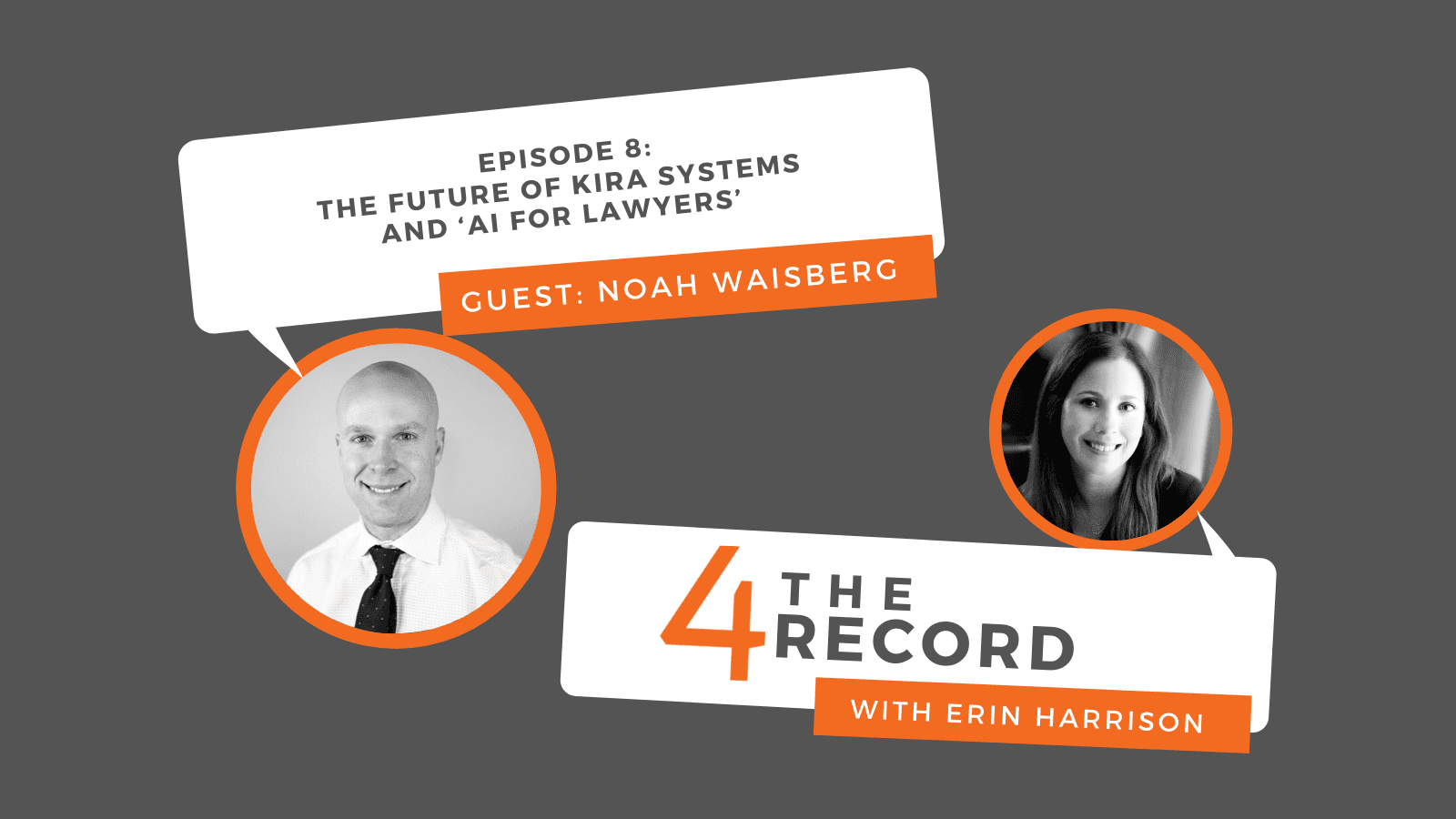
Last year (2020) proved to be an inflection point for artificial intelligence (AI) technology adoption within the legal industry. While many lawyers were warming up to the idea of AI and implementing machine learning in certain pockets of their organization, the emergence of COVID-19 pushed even those who were previously apprehensive to accept the inevitable – AI is useful and even necessary.
Noah Waisberg, CEO of Kira Systems, an AI-powered contract analysis company, sat down with Plat4orm’s Managing Director Erin Harrison for our latest episode of 4 The Record to discuss the status of AI adoption within legal and how his new book, AI For Lawyers, can offer practical advice for implementation.
“The overarching story is that there is a lot of AI usage in law already, and we thought that was one important message to get across [in the book],” Waisberg said. “The other one is that this doesn\’t have to be a bad thing. This can actually be a really positive thing for lawyers if they choose to embrace it.”
In 2020, the market had a lot of technology-based changes to deal with – and we did so successfully. But now, many legal professionals are starting to think about what else can be done differently. After the move to remote work forced firms and legal departments to utilize tools and software, they previously were reluctant to adopt, the general sentiment in the industry seems to have changed and become more accepting of advanced technologies like AI.
“[There is an] economic case for how you can do work more efficiently [with AI], even if you are an hourly billing lawyer; it can actually work in your best interest,” Waisberg said. He noted that the book approaches adoption from both large and small-firm mindsets to ensure the advice speaks to the unique concerns of each group. Multiple practical use cases for AI are laid out, including employee training, knowledge management, eDiscovery, legal research, and contract analytics.
One of the more surprising use cases mentioned in the book for AI is knowledge transfer. At a major law firm, a retiring partner and knowledge management expert were able to work together and deploy machine learning to capture much of the expertise this partner had in his head that would otherwise have been difficult to accurately pass on to the junior employee(s) taking on his work.
“What AI enables lawyers to do is to capture their expertise in a system,” Waisberg explained.
How? By “teaching” software to recognize concepts like change of control, assignment, and exclusivity in legal language. In the early days of Kira, Waisberg would read a contract and point the system to the exclusivity language. From that the software would learn. Then, when a junior employee was reviewing contracts without a senior partner present to share their experience and insights, the AI would be able to guide the junior associate toward the right decision based on what it learned in training.
“It is like bottling up [your] expertise and putting it there so that a first-year someday would have that available to them,” Waisberg said. “I think more and more lawyers are going to be able to do that: encapsulate part of themselves in AI and be able to actually deliver their expertise even when they\’re not there.”
But even outside of this compelling use case, the value proposition for AI to handle the more basic, error-prone elements of legal work, such as high-volume contract analysis and research, is already quite clear. Whether they are junior employees reviewing documents or seasoned industry veterans, humans are prone to error and subject to fatigue that undermines their ability to focus and absorb information with complete accuracy.
When humans and AI combine their expertise, however, lawyers can do more of the truly substantive work they should be doing and practice law the right way, unconstrained by time pressures and unburdened by repetitive, tedious tasks.
“Humans miss 100 percent of the things they don’t look at,” Waisberg said. “AI can help you make your standard process better. We’ve heard over and over again – and have experienced it ourselves – of our software finding stuff that a lawyer might miss, even a careful lawyer, even an experienced lawyer.”
So, while it’s fair to say COVID-19 served as the catalyst, industry players are now warming up to the idea of adopting AI – and other more robust, advanced legal-technologies – because of the undeniable benefits we’ve seen so far.
To hear more about AI implementation, details on Kira’s strategic restructuring that was announced earlier in 2021 and what’s in the pipeline for them (including a potential dual product launch later this year), listen to the full podcast on Plat4orm’s website.
Danielle Kane is an associate, media & influencer relations, at Plat4orm.

